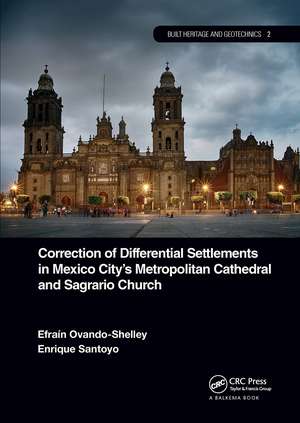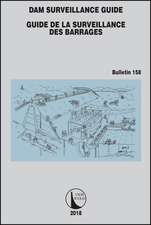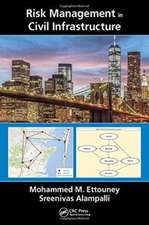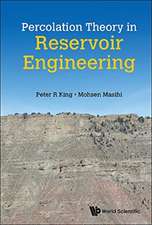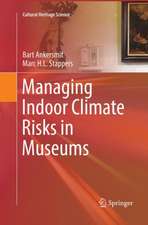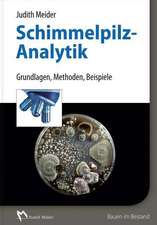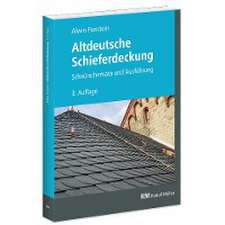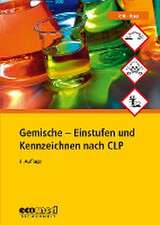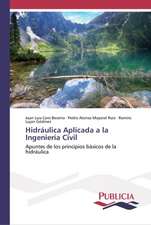Correction of Differential Settlements in Mexico City's Metropolitan Cathedral and Sagrario Church: Built Heritage and Geotechnics
Autor Efraín Ovando-Shelley, Enrique Santoyoen Limba Engleză Paperback – 31 mai 2023
The work will appeal to both students and professionals in the fields of Architecture and Civil Engineering. It will also interest specialized audiences of geotechnical engineers and conservation architects and it may also be of value to art historians.
| Toate formatele și edițiile | Preț | Express |
|---|---|---|
| Paperback (1) | 306.73 lei 43-57 zile | |
| CRC Press – 31 mai 2023 | 306.73 lei 43-57 zile | |
| Hardback (1) | 888.05 lei 43-57 zile | |
| CRC Press – 10 dec 2019 | 888.05 lei 43-57 zile |
Preț: 306.73 lei
Preț vechi: 383.90 lei
-20% Nou
Puncte Express: 460
Preț estimativ în valută:
58.69€ • 61.44$ • 48.56£
58.69€ • 61.44$ • 48.56£
Carte tipărită la comandă
Livrare economică 07-21 aprilie
Preluare comenzi: 021 569.72.76
Specificații
ISBN-13: 9781032570846
ISBN-10: 1032570849
Pagini: 98
Dimensiuni: 174 x 246 mm
Greutate: 0.18 kg
Ediția:1
Editura: CRC Press
Colecția CRC Press
Seria Built Heritage and Geotechnics
ISBN-10: 1032570849
Pagini: 98
Dimensiuni: 174 x 246 mm
Greutate: 0.18 kg
Ediția:1
Editura: CRC Press
Colecția CRC Press
Seria Built Heritage and Geotechnics
Public țintă
GeneralCuprins
1. Introduction. 2. Description of Foundations. 3. Foundation Modifications. 4. Characteristics of the Subsoil. 5. Regional Subsidence. 6. Geotechnical Diagnosis. 7. Solutions Analyzed. 8. Underexcavation at the Cathedral and at the Sagrario. 9. Geometrical Correction Achieved. 10. Assessment of Mortar Injections. 11. Hardening of the Subsoil. 12. Observed Behavior. 13. Final Remarks. Appendices.
Recenzii
"Mitigating [the] harmful effects of differential settlements" of subsoil is the focus of this work by Ovando-Shelley (National Autonomous Univ. of Mexico) and Santoyo (also UNAM, now deceased). This compelling book not only attests to the importance of built environments but also describes in detail the preventive and corrective actions—in this case, to subsoil—needed to enable their continued existence. The adjoining cathedral and church edifices have a long history of residing on unstable soil. In just 85 pages, 13 chapters and 4 appendixes, the authors concisely relay in retrospect the centuries of site construction and repair—beginning with Aztec temples built on an islet in the middle of a lake in 1325. They discuss the soil remediation techniques that have been necessary over time and elaborate on current methods of underexcavation, such as subsoil hardening through mortar grouting and pore-water recharge. The geotechnical diagnosis and geometrical corrections are explained in meticulous detail, and the information has significance for worldwide preservation efforts. Beautiful color and black-and-white illustrations, including photos, diagrams, and plans, enhance the remediation and restoration discussions. This powerful presentation demonstrates not only the importance of historic buildings to community but also the value of retaining them and doing so with modern technology. A superb acquisition for every technical library.
Summing Up: Highly recommended. Lower- and upper-division undergraduates. Graduate students, faculty and professionals. Students enrolled in two-year technical programs.
L.B. Allsopp (Arizona State University) in CHOICE, December 2020, Vol. 58, No. 4
Summing Up: Highly recommended. Lower- and upper-division undergraduates. Graduate students, faculty and professionals. Students enrolled in two-year technical programs.
L.B. Allsopp (Arizona State University) in CHOICE, December 2020, Vol. 58, No. 4
Notă biografică
Efraín Ovando-Shelley is a Civil Engineer (UNAM, Universidad Nacional Autónoma de México, 1977) with a Master in Engineering, (Applied and theoretical mechanics, UNAM, 1980), MSc, DIC (1982, Soil Mechanics and Engineering Seismology, Imperial College, London) and PhD (1986, Soil Mechanics, Imperial College, London). He has been a Research Engineer at the Instituto de Ingeniería, UNAM from 1986 and a lecturer at the School of Engineering (undergraduate and post graduate courses) from 1989.
He is the author of several dozen publications: research papers, technical reports, books and book chapters. Has performed research on the behaviour of loose granular materials and has looked experimentally at the static and dynamic behaviour of the soft lacustrine Mexico City clays. Has also participated in numerous foundation engineering problems including the project for the geometrical correction of Mexico City’s Metropolitan Cathedral and the ongoing project for a new airport for Mexico City at a site with extremely soft and very compressible soils. He is a geotechnical consultant for Mexico’s National Institute of Anthropology and History and a core member of TC301, the Technical Committee on the Preservation of Historical Sites and Monuments, ISSMGE.
Enrique Santoyo was a Civil Engineer who held a Master in Engineering from the School of Engineering at the National University of Mexico (UNAM). Santoyo received a doctoral degree in Architecture from the School of Architecture, UNAM, Mexico in 2010. He also held a degree from the Colorado School of Mines and from Duke University, in the USA. His professional career started at Solum, Geotechnical Consultants, where he practiced geotechnics from 1960 to 1967. He then joined the staff of research engineers at the Instituto de Ingeniería and the School of Engineering, UNAM, from 1967 to 1982. He founded his own firm of geotechnical consultants, TGC, in 1982. He passed away in June 2016.
Santoyo participated in more than 1000 projects in Mexico and was also acting consultant for several hydroelectric projects in Peru and Ecuador and other related projects in Central America and the Caribbean. Most of his publications were written in Spanish and directed to his colleagues in Mexico and the whole of the Americas. He was a member of the Mexican Academy of Engineering and was awarded several recognitions by his peers within the Mexican Society for Geotechnical Engineering (including the Nabor Carrillo Lecturer).
He devised the practical aspects of underexcavation as applied to Mexico City´s Metropolitan Cathedral and later, adapting the technique he developed in that project, he corrected the inclination of at least some 120 tilted buildings in and around Mexico City.
He is the author of several dozen publications: research papers, technical reports, books and book chapters. Has performed research on the behaviour of loose granular materials and has looked experimentally at the static and dynamic behaviour of the soft lacustrine Mexico City clays. Has also participated in numerous foundation engineering problems including the project for the geometrical correction of Mexico City’s Metropolitan Cathedral and the ongoing project for a new airport for Mexico City at a site with extremely soft and very compressible soils. He is a geotechnical consultant for Mexico’s National Institute of Anthropology and History and a core member of TC301, the Technical Committee on the Preservation of Historical Sites and Monuments, ISSMGE.
Enrique Santoyo was a Civil Engineer who held a Master in Engineering from the School of Engineering at the National University of Mexico (UNAM). Santoyo received a doctoral degree in Architecture from the School of Architecture, UNAM, Mexico in 2010. He also held a degree from the Colorado School of Mines and from Duke University, in the USA. His professional career started at Solum, Geotechnical Consultants, where he practiced geotechnics from 1960 to 1967. He then joined the staff of research engineers at the Instituto de Ingeniería and the School of Engineering, UNAM, from 1967 to 1982. He founded his own firm of geotechnical consultants, TGC, in 1982. He passed away in June 2016.
Santoyo participated in more than 1000 projects in Mexico and was also acting consultant for several hydroelectric projects in Peru and Ecuador and other related projects in Central America and the Caribbean. Most of his publications were written in Spanish and directed to his colleagues in Mexico and the whole of the Americas. He was a member of the Mexican Academy of Engineering and was awarded several recognitions by his peers within the Mexican Society for Geotechnical Engineering (including the Nabor Carrillo Lecturer).
He devised the practical aspects of underexcavation as applied to Mexico City´s Metropolitan Cathedral and later, adapting the technique he developed in that project, he corrected the inclination of at least some 120 tilted buildings in and around Mexico City.
Descriere
This book describes the geotechnical aspects for correcting the geometry of Mexico City´s Metropolitan Cathedral and of the adjoining Sagrario Church. The work will appeal to students and professionals in the fields of Architecture and Civil Engineering, from geotechnical engineers and conservation architects to art historians.
